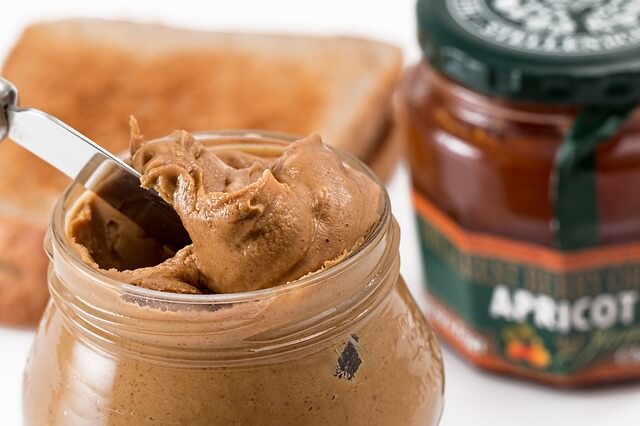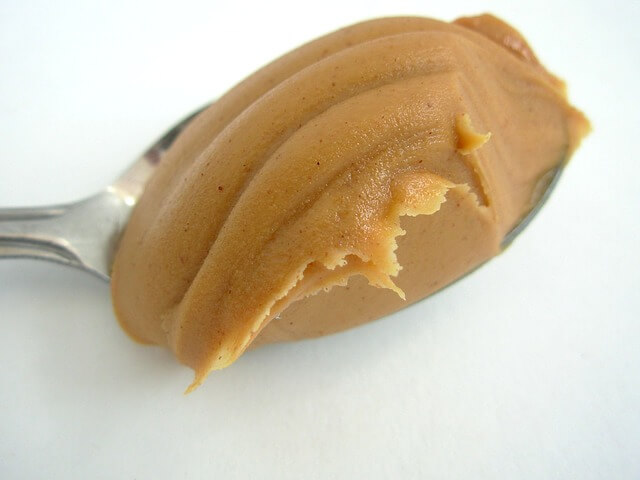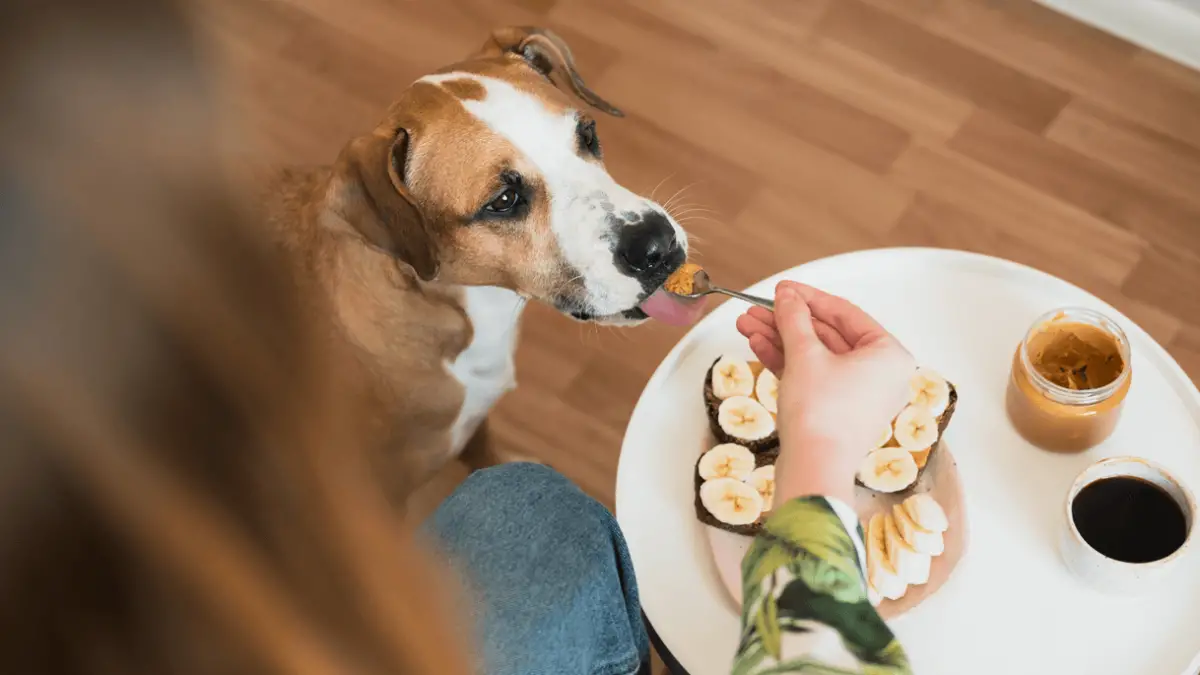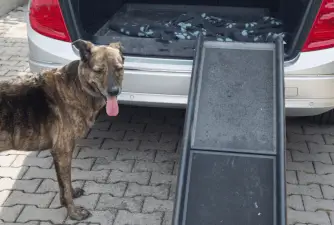Is Peanut Butter Good for Dogs?
26.02.2021.
It is no secret that dogs and peanut butter have a long-lasting relationship. Still, the questions most owners want to know the answer to are - Can dogs eat peanut butter? Is peanut butter good for dogs? Stick with us, and we will tell you all about dogs and this delicious treat.
Can dogs eat peanut butter?
The shortest possible answer to that question is - YES. Dogs can eat most brands of peanut butter, but there are things you should know before you decide to give your dog this delicious treat.
Some peanut butter brands contain too much salt, and dogs have delicate sodium levels, so make sure you pick the right brand for your dog. They can also contain artificial sweeteners and coloring, and those should be avoided. But first, let’s see what happens if dogs get any benefits from this food.

Is peanut butter good for dogs?
Like with any other treat you would want to give your dog - moderation is the key. Peanut butter can be very good for dogs, and it can offer plenty of valuable nutrients. Not only does it taste exceptionally well if given in moderation, but it can also be very healthy.
Peanut butter and peanuts, in general, are packed with healthy nutrients that can be really beneficial for your dog’s body. The only thing you need to think about is the amount you give to your dog. Treats and other things that are not the central part of their diet should never make the most significant part of their daily food intake. Some of the best things peanut butter for dogs can offer them are;
- Vitamin B - B vitamins are essential building blocks of a healthy body. They help the dog’s body in different ways and play a part in various functions. Vitamin B is essential for good health, brain functions, energy levels, and cell metabolism. B complex helps fight infections and promotes cell health.
- Vitamin E - Vitamin E doesn’t have an important role as perhaps vitamin C or B. Still, it is essential for skin and eye health. Plus, it boosts the dog’s immune system and helps fight off bacteria and viruses.
- Healthy fats - Healthy fats are actually monounsaturated fatty acids. Scientists proved that dogs that eat foods containing healthy fats have many health benefits. The most noticeable ones are - reduced blood cholesterol levels, reduced risk of heart disease, and reduced risk of developing canine diabetes.
- Niacin - Niacin is a part of the B vitamin family, and its job is to help convert food into energy. Niacin in peanut butter for dogs also helps keep their immune and digestive systems healthy, and it promotes skin health.
Peanuts are the main ingredient of peanut butter, and if you want to know more about giving them to your furry friend, check out this article - Can dogs eat peanuts?
Is peanut butter bad for dogs?
Unfortunately, there are some cases when peanut butter is bad for dogs. You should always keep in mind not to give your dog too much of it because it is not a balanced source of nutrients. The truth is that dogs can eat peanut butter, but you shouldn’t be too carefree with it.
Make sure you control their intake and take special care of which brand of peanut butter you decide to give your dog. You should avoid three main things as much as you can: xylitol, trans fats, and aflatoxins.
Cashews are a popular human snack, but can dogs eat them? Check out this article - Can dogs eat cashew nuts?
Xylitol
Some brands contain xylitol. It is an artificial sweetener that is used to replace actual sugar, and while it may be safe for humans, it is toxic to dogs. Xylitol from peanut butter for dogs will cause a rapid insulin release which will cause a drop in blood sugar levels. The exact term is hypoglycemia. It can affect your dog only 10 minutes after they have consumed it.

Trans fats
Trans fats are the unhealthy fats used in some foods to prolong their shelf life. They are very unhealthy and can cause health problems like canine diabetes, pancreatitis, and heart disease. If you can avoid trans fats in the peanut butter for your dog, you should do so.
Aflatoxins
Aflatoxins are naturally occurring toxins produced by a fungus found in peanuts. If you never heard of aflatoxins, don’t be surprised. Even the FDA warns about problems that can arise from overexposure to them. They are naturally found in peanuts, so make sure you regulate the dosage of peanut butter for dogs.
Ever thought about giving your dog watermelon? Check out this article - Can dogs eat watermelon?
The safest peanut butter for dogs
Probably the safest way to give peanut butter to your dog is to make it yourself. Home-made peanut butter won’t contain toxic things like xylitol. You can be absolutely sure about all the ingredients you used for making it. The answer to the question “Can dogs eat peanut butter?” will then become a lot clearer. Here is how you can make peanut butter for dogs at home;
You will need:
- One and a half cup of unsalted, roasted peanuts
- One tablespoon chia seeds
- One teaspoon of honey (up to you)
- One teaspoon of peanut oil
- Place the peanuts in a blender and start crushing peanuts until they become dust-like.
- Start adding other ingredients and mix until you achieve the desired consistency.
- Place the peanut butter in the fridge and let it chill overnight. Make sure you use an airtight container.
Voila! You have healthy, home-made peanut butter. Keep in mind that just because it is home-made doesn’t mean it is not packed with calories. Keep the portions small and controlled.
Health warning
Some dogs, like humans, can have peanut allergies. If your dog is allergic to peanuts, it is absolutely vital you do not give your dog peanut butter. They can have a severe reaction that can cause an anaphylactic shock, and the consequences can be dire. Here are some symptoms of peanut butter allergies in dogs:
- Coughing
- Hives
- Panting
- Swelling
- Fever
- Breathing problems
- Sneezing
Make sure you start slow and give only a tiny bit of peanut butter to your dog the first time they try it. Observe their reaction and check for signs of allergies. If you notice any symptoms - call your vet and ask for advice.
World Dog Finder team







Share